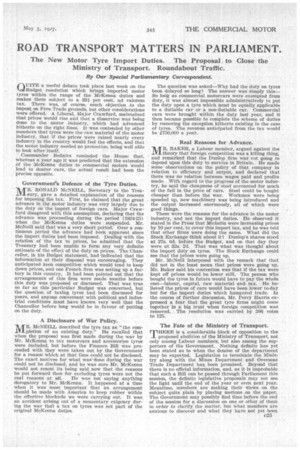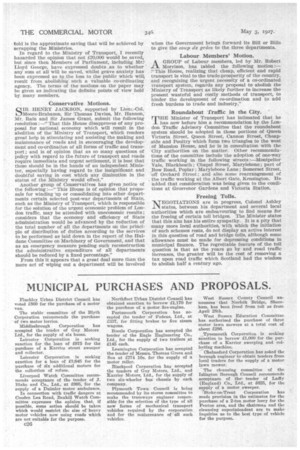ROAD TRANSPORT MATTERS IN PARLIAMENT.
Page 47

Page 48

If you've noticed an error in this article please click here to report it so we can fix it.
The New Motor Tyre Import Duties. The Proposal to Close the Ministry of Transport. Roundabout Traffic.
By Our Special Parliamentary Correspondent.
QUITE a useful debate took place last week on the Budget resolution which brings imported motor tyres within the range of the McKenna duties and makes them subject to a 33* per cent. ad valorem tax. There was, of course, much objection to the impost on Free Trade grounds, but other considerations were offered. A Liberal, Major Crawfard, maintained that prices would rise and that a disservice was being done to the motor industry, which had advanced hitherto on the right lines. It was contended by other members that tyres were the raw material of the motor industry, that if the prices were raised nearly every industry in the country would feel the effects, and that the motor industry needed no protection, being well able to look after itself.
Commander Bellairs reminded the House that, whereas a year ago it was predicted that the extension of the McKenna duties to• commercial motors would lead to dearer cars, the actual result had been the precise opposite.
Government's Defence of the Tyre Duties.
MR. RONALD McNEILL, Secretary to the . Treasury, gave a detailed explanation of the reasons for imposing the tax. First, he claimed that the great advance in the motor industry was very largely due to the duty on the impOrt of foreign cars. Major Crawfurd disagreed with this assumption, declaring that the advance was proceeding during the period (1924-25) when the McKenna duties were suspended. Mr. McNeill said that was a very short period. Over a continuous period the advance had been apparent since the import duties had been imposed. Dealing with the relation of the tax to prices, he admitted that the Treasury had been unable to form any very definite estimate of the effect of the duty on prices. The Chancellor, in his Budget statement, had 'Indicated that the information at their disposal was encouraging. They anticipated keen competition which would tend to keep down prices, and one French firm was setting up a factory in this country. It had been pointed out that the arrangements of this firm were made months before this duty was proposed or discussed. That was true so far as this particular Budget was concerned, but the question of taxing tyres had been discussed for years, and anyone conversant with political and industrial conditions must have known very well that the Chancellor before long would be in favour of putting on the duty.
A Disclosure of War Policy.
MR. MeNEILL described the tyre tax as "the completion of an existing duty." He recalled that when the proposal was first made during the war by Mr. McKenna to tax motorcars and accessories tyres were included, but before the Finance Bill was proceeded with they were taken out by the Government for a reason which at that time could not be disclosed. The exact motives for what was-done during the war could not be disclosed, and he was sure Mr. McKenna would not resent its being said now that the reasons he put forward then for excluding tyres were not the
real reasons at ail. He was not saying anything derogatory to Mr. McKenna. It happened at a time when it was most important that an arrangement should be made with America to keep rubber within the effective blockade we were carrying out. It was an accident arising out of a momentary exigency during the war that a tax on tyres was not part of the original McKenna duties. The question was asked—Why had the duty on tyres been delayed so long? The answer was simply this— So lonk as commercial motorcars were exempted from duty, it was almost impossible administratively to put the duty upon a tyre which must be equally applicable to a dutiable car or a non-dutiable car. Commercial cars were brought within the duty last year, and it then became possible to complete the scheme of duties by removing the exception hitherto existing in the case of tyres. The revenue anticipated from the tax would be £750,000 a year.
Real Reasons for Advance.
MR. BAKER, a Labour member, argued against the theory that foreign competition was a killing thing, and remarked that the Dunlop firm was not going to depend upon this duty to survive in Britain. He made some observations on the policy of that company in relation to efficiency and output, and declared that there was no relation between wages paid and profits made. With regard to the progress of the motor industry, he said the cheapness of steel accounted for much of the fall in the price of cars. Steel could be bought cheaper than before the war. Workmen were being speeded up, new machinery was being introduced and the output increased enormously, all of which were good things.
These were the reasons for the advance in the motor industry, and not the import duties. He observed it stated in the Press that Michelin were increasing prices by 10 per cent. to cover this import tax, and he was told that other firms were doing the same. What did the Stock Exchange think about it? Dunlop's shares stood at 27s. 6d. before the Budget, and on that day they were at 328. 2d. That was what was thought about the import duty, on tyres. The Stock Exchange could see that the prices were going up. Mr. McNeill interposed with the remark that that did not in the least mean that prices were going up. Mr. Baker said his contention was that if the tax were kept off prices would be lower still. The person who bought the tyres in future would have to pay the whole cost—labour, capital, raw material andtax. He believed the prices of cars would have been lower to-day but for the import duties which hampered trade. In the course of further discussion, Mr. Percy Harris expressed a fear that the great tyre firms might come together in a big trust when foreign competition was removed. The resolution was carried by 206 votes to 125.
The Fate of the Ministry of Transport.
THERE is a considerable block of opposition to the proposed abolition of the Ministry of Transport, not only among Labour members, but also among the supporters of the Government. Nothing definite has yet been stated as to when the demise of the department may be expected. Legislation to terminate the Ministry along with the Mines Department and Overseas Trade Department has been promised. Beyond that there is no official information, and, as it is improbable that such a Bill can be passed through Parliament this session, the definite legislative proposals may not see the light until the end of the year or even next year. Meantime, members are making their views on the subject quite plain by placing motions on the paper. The Government may possibly find time before the end of the session for a discussion on one or other of them in order to clarify the matter, but what members are anxious to discover and what they have not yet been
told is the approximate saving that will be achieved by scrapping the Ministries.
In regard to the Ministry of Transport, I recently hazarded the opinion that not £20,000 would be saved, but since then Members of Parliament, including Mr., Lloyd George, have expressed doubts . as to whether any sum at all will be saved, whilst grave anxiety has been expressed as te the loss to the public which will; result from abolishing such a valuable co-ordinating agency. The terms of the motions on the paper may be given as indicating the definite points of view held by many members.
Conservative Motions.
SIR HENRY JACKSON, supported by Lieut.-Col. Moore-Brabazon, Sir Thomas Davies, Mr. Hannon; Mr. Rain and Sir James Grant, submit the following resolution :—" That this House disapproves of any proposal for national economy which will result in the abolition of the"Ministry of Transport, which renders great help in stimulating and assisting the making and maintenance of roads and in encouraging the development and co-ordination of all forms of traffic and transport; and is of opinion that as so many questions of policy with regard to the future of transport and roads require immediate and urgent settlement, it is best that these should be in the hands of an independent Minister, especially having regard to the insignificant and doubtful saving in cost which any diminution in the status of the Ministry would effect."
Another group of Conservatives has given notice of the following:—" This House is of opinion that proposals for winding 'up or consolidating into other departments certain selected post-war departments of State, such as the Ministry of Transport, which is responsible for the solution of the urgent economic problem of London traffic, may be attended with uneconomic results; considers that the economy and efficiency of State administration would be advanced by the reduction of the total number of all the departments on the principle of distribution of duties according to the services to be performed as laid down in the report of the Haldane Committee on Machinery of Government, and that as an emergency measure pending such reconstruction the administrative. expenditure of all departments should be reduced by a fixed percentage."
From this it appears that a great deal more than the mere act of wiping out a department will be involved when the Government brings forward its Bill or Bills to give the coup de grace to the three departments.
Labour Members' Motion.
AGROUP of Labour members, led by Mr. Robert Morrison, has tabled the following motion :— !` This House, realizing that cheap, efficient and rapid transport is vital to the trade prosperity of the country, and recognizing the urgent necessity of a co-ordinated transport system, regards any proposal to abolish the Ministry of Transport As likely further to increase the present wasteful and costly methods of transport, to hinder the development of co-ordination and to add fresh burdens to trade and industry."
Roundabout Traffic in the City.
TRE Minister of Transport has intimated that he has now before him a recommendation by the London Traffic Advisory Committee that the roundabout system should be adopted in those portions of Queen Victoria Street, Queen Street, Cannon Street, Cheapside and Poultry which form two triangles to the west of Mansion House, and he is in consultation with the City authorities on the matter. Other recommendations of the committee include the adoption of one-way traffic working in the following streets :—Montpelier Vale, Blackheath ; Chapel Street, Marylebone; part of Bow Road, Poplar ; Marylebone Lane; Somerset Street, off Orchard Street; and also some rearrangement of , the traffic working at the Albert Gate, Kensington. He added that consideration was being given to the conditions at Grosvenor Gardens and Victoria Station.
Freeing Tolls.
NEGOTIATIONS are in progress, Colonel Ashley states, between his department and several local authorities which are endeavouring to find means for the freeing of certain toll bridges. The Minister states that this aim has his entire sympathy. It is a pity that many more local authorities, with which the initiation of such schemes rests, do not display an active interest in this question of road and bridge tolls, although some
• allowance must be made for depressing conditions in municipal finance. The regrettable feature of the toll question is that as the years go by and road traffic increases, the greater will be the cost of removing a tax upon road traffic which Scotland had the wisdom to abolish half a century ago.












































































































